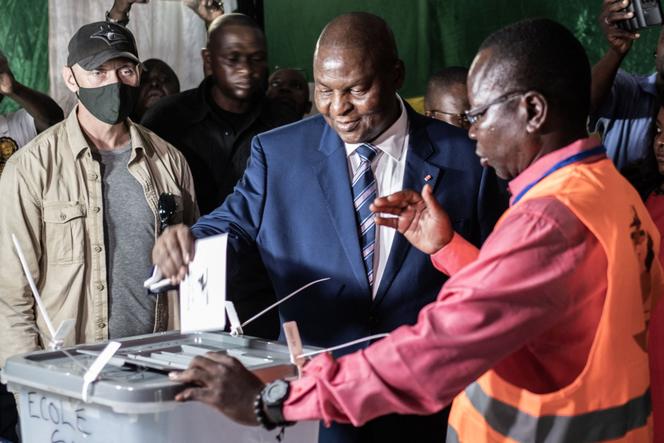


There is now nothing that stands in the way of President Faustin Archange Touadéra remaining in power in the Central African Republic. The draft of the new constitution, which enables him to run for a third term in 2025, was overwhelmingly approved in a referendum. According to the results presented by the National Elections Authority (ANE) on Monday August 7, the "yes" vote won by 95.27%, with a turnout of 61.10%, despite a boycott by the opposition, which denounced the vote as a "farce."
In the absence of recognized independent observers, these figures are difficult to verify. However, Fidèle Gouandjika, Minister Counsellor to the President of the Central African Republic, is delighted. The turnout was higher than "any presidential election or referendum the country has ever seen," he claimed. "The adoption of the text will mark the true date of our country's independence and the beginning of a new Chinese-style democracy."
For the first time in an African election, the paramilitaries of the Wagner Group were openly involved in the vote, providing security and logistical support. "The vote took the form of a plebiscite in favor of President Touadéra," says Charles Bousel, researcher at the International Crisis Group. "Hardly anyone had read the new constitution, which was tailored to bypass the obstacles encountered by the regime."
In addition to ending presidential term limits, which have been extended from five to seven years, the reform makes three major changes. Firstly, the Constitutional Court, which had opposed the referendum project, is transformed into a council, where the majority of members are appointed by the government. Secondly, the National Assembly loses its right of control over mining contracts. As Bouessel noted, "We remember that the former occupant of the post, Karim Meckassoua, was dismissed for wanting a closer look at the agreements signed with the Russians." Finally, the creation of the position of vice-president, as second-in-command of the state, who replaces the president in the event of a power vacuum, completes the weakening of the other institutions in this hyper-presidential regime.
"The redistribution of posts will enable President Touadéra to compensate those who hoped to succeed him, and to reward the most loyal," the researcher added. Simplice Mathieu Sarandji, the current President of the National Assembly, is a strong favorite for the vice-presidency. A long-time companion of President Touadéra since his university days in Bangui, he was in turn his secretary general, his chief of staff and then his prime minister.
Excluded for having publicly doubted the advisability of the referendum, Sarandji finally rejoined the campaign after changing his mind on his return from a trip to Russia. Evariste Ngamana, the current first vice-president of the National Assembly, has been omnipresent during the referendum campaign, and could succeed him unless the head of state makes a surprising gesture of reconciliation.
For the opposition, it's a harsh blow. Some of its leading figures find themselves disqualified from running in the 2025 presidential election by a new constitutional provision prohibiting dual nationals from running for the highest office. Anicet Georges Dologuélé and Crépin Mboli-Goumba, who hold French and American citizenship respectively, are the main ones affected.
The ability to cause trouble of the armed groups that controlled most of the territory five years ago has been considerably reduced by the combined action of Wagner's paramilitaries and former rebels who have become ministers. "They seem too weakened by internal dissension to represent a threat, at least in the short term," explained John Lechner, journalist and researcher specializing in the Central African Republic.
President Touadéra has a clear way ahead. "It's perpetuating his mode of governance. Despite the abuses committed by the Russians and the national army against civilians, his strategy has paid off both nationally and internationally," Bouessel noted. After having tried unsuccessfully to obtain the departure of Wagner's mercenaries by playing the diplomatic isolation card, Western chancelleries are now trying the easy way.
After months of frosty relations, President Macron met twice with his CAR counterpart, who he nonetheless described as a "Wagner hostage" in May 2022. "There really is no alternative," lamented one diplomat. Anti-French campaigns have since declined in intensity, while the Frenchman Rémy Quignolot, accused of espionage and held for almost two years in Bangui, has been repatriated for health reasons.
"The effects are being felt in the economy," said a former aide to the head of state. "Salaries are being paid thanks to the World Bank, and the IMF has softened its stance by granting new credit facilities after the Western intervention." "They swapped the stick for the carrot, but without obtaining any concrete guarantees," an observer added. Indeed, on the ground, the Wagner Group, better established than ever, quickly denied the rumors of its possible departure sparked by Yevgeny Prigozhin's short-lived rebellion against Moscow. "Wagner's activities depend on the agreements signed with President Touadéra," Bouessel recalled. "If the president stays, they stay too."
Translation of an original article published in French on lemonde.fr; the publisher may only be liable for the French version.
